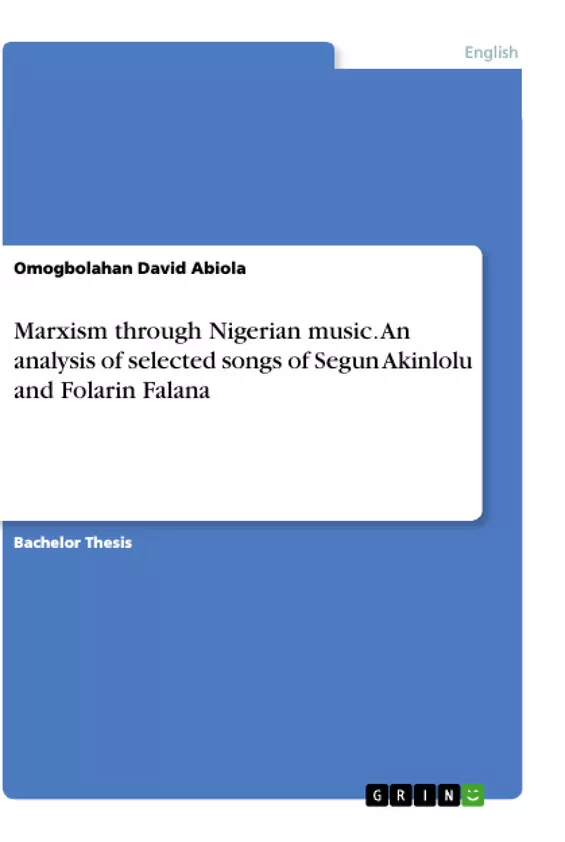This work focuses on exploring the concept of Marxism through Nigerian music and by examining how artists have been able to use the institution of music as an instrument of evaluating society. Music is not regarded as entertainment alone but it is seen as an instrument of revolution and a tool through which artistes proffer solutions to various societal problems. Music and society are inseparable entities and the latter is a great reflection of the former. Music, in several ways, depicts the culture of a society; it is a reflection of the total way of life of a certain milieu. It does not exist in a vacuum but within the cyclic continuum of the communal life of the people.
This discourse looks into the songs of two musicians. They are Segun Akinlolu (Beautiful Nubia) and Folarin Falana (Falz). The songs examined are Ominira, Revolution Time, Everybody Knows, We Live Here Too, Matters Arising, Masters of the Earth, Locust Season, The People Are Ready, The Small People’s Anthem, Harvest Time, Higher Steps, Boosit and Wehdone sir.
Inhaltsverzeichnis (Table of Contents)
- CHAPTER ONE
- General Introduction
- Background of Study
- Statement of Problem
- Research Questions
- Aim of Study
- Significance of Study
- Scope of Study
- Theoretical Framework
- Research Methodology
- BACKGROUND OF SELECTED ARTISTES
- Segun Akinlolu
- Folarin Falana
- CHAPTER TWO
- INTRODUCTION
- SOCIOLOGICAL SCHOOL OF THOUGHT
- Importance of Marxism to Sociological School of Thought
- Importance of Marxism to Literature
- FUNDAMENTAL PRINCIPLES OF MARX'S THOUGHT
- Critique of Capitalist Society
- Adaptation to Hegelian Dialectic
- The Materialistic Conception of History
- The Dialectical Movement of History
- Economic Base and Superstructure
- The Division of Labour
- Marx's Conception of Ideology
- Marx's Economic Views
- The State and Marxism
- Defining the term Music
- Music and Emotions
- Music as a tool for entertainment
- Music and Identity
- Marxism and Music
- Conclusion
- CHAPTER THREE
- THEMATIC EVALUATION OF THE SONGS OF SEGUN AKINLOLU AND FOLARIN FALANA
- General Introduction
- A CRITICAL ANALYSIS OF BEAUTIFUL NUBIA'S AND FALZ'S MUSICAL STYLE
- IMOREMI
- MATTERS ARISING BY BEAUTIFUL NUBIA
- Recklessness and Dishonesty of Government
- BOOSIT BY FALZ AND COBHAMS
- WE LIVE HERE TOO
- Revolutionary Tool of the Proletariat
- MASTERS OF THE EARTH
- HARVEST TIME
- HIGHER STEPS
- REVOLUTION TIME
- THE PEOPLE ARE READY
- War between Bourgeoisie and Proletariat
- Exploitations by the Government on the Masses
- OMINIRA
- EVERYBODY KNOWS
- Characteristics of a Marxist Society
- LOCUST SEASON
- THE SMALL PEOPLE'S ANTHEM
- WEHDONE SIR
- Conclusion
- CHAPTER FOUR
- Summary and Conclusion
- Summary
- Summary and Conclusion
Zielsetzung und Themenschwerpunkte (Objectives and Key Themes)
This work aims to analyze selected songs of Segun Akinlolu (Beautiful Nubia) and Folarin Falana (Falz) through a Marxist lens. The study seeks to understand how these musicians utilize their music to address social and political issues in contemporary Nigeria.
- Marxist principles and their application to the study of music and literature
- The social and political contexts of Nigerian music and its relationship to power structures
- Thematic analysis of selected songs of Beautiful Nubia and Falz, focusing on their critiques of capitalism, inequality, and government corruption
- The role of music as a tool for social change and awareness in contemporary Nigeria
- The intersection of music, identity, and social consciousness in the context of a developing nation
Zusammenfassung der Kapitel (Chapter Summaries)
Chapter One introduces the study and outlines its research objectives, methodology, and theoretical framework. It provides background information on the selected artists, Segun Akinlolu (Beautiful Nubia) and Folarin Falana (Falz).
Chapter Two delves into the Marxist theoretical framework. It explores the core principles of Marx's thought, including his critique of capitalism, the materialist conception of history, and the concept of ideology. The chapter also examines the relevance of Marxism to the sociological school of thought and its application to the study of music.
Chapter Three focuses on a thematic evaluation of the selected songs by Beautiful Nubia and Falz. It examines the musical styles of both artists and analyzes key themes emerging from their works, such as government corruption, inequality, and the struggle for social justice.
Schlüsselwörter (Keywords)
Key terms and concepts explored in this study include Marxist theory, music analysis, Nigerian music, social commentary, political discourse, capitalism, inequality, government corruption, social justice, and the role of music in social change.
- Citation du texte
- Omogbolahan David Abiola (Auteur), 2017, Marxism through Nigerian music. An analysis of selected songs of Segun Akinlolu and Folarin Falana, Munich, GRIN Verlag, https://www.grin.com/document/1133701



